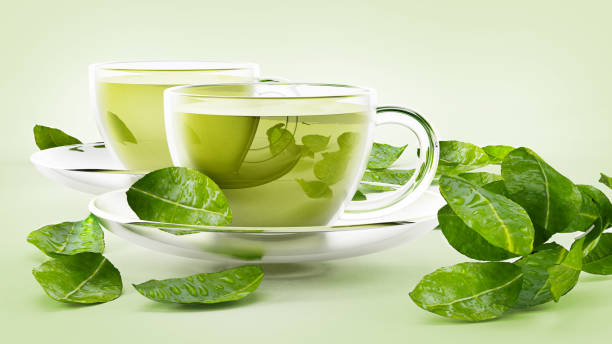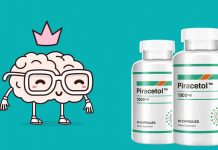
Tea or coffee? That’s the age-old question that’s haunted caffeine consumers for the past three hundred years. As it turns out though, while coffee does certainly have some incredible benefits, the benefits of green tea are just as astounding.
According to the one of Spain’s top universities, tea is the most widely consumed drink in the world after water[1]. Is this just a coincidence, or has the 5,000-year-old Chinese culture realized something about the benefits of green tea that we haven’t?
Well according to science, there’s actually a ton of health properties to be found in green tea, but the best may not have been found yet.
Scientific Benefits of Green Tea
1. Promotes Bone Health
Anyone who’s been active for long enough knows how common injuries can be in any sort of sport, or even some exercise regimens.
Running can cause shin splints, weight lifting with improper form can dislocate joints, and sports such as skiing or martial arts can lead to completely shattered bones, and sometimes even death if you’re not careful.
So, when we found out about the bone-strengthening benefits of green tea, we had to report them here on muscle planet. According to a study conducted at the University of Hong Kong, the catechins in green tea were found to boost bone growth by a whopping 79%[2]:
“In this study, three tea catechins, epigallocatechin (EGC), gallocatechin (GC), and gallocatechin gallate (GCG), were investigated for their effects on bone metabolism. The effects of the tea catechins on bone formation were evaluated using cultured rat osteoblast-like osteosarcoma cell line UMR-106. EGC stimulated alkaline phosphatase activity significantly at concentrations of 10 and 20 μM.”
“The amount of mineralization also increased significantly with EGC. On another cell culture platform, EGC significantly inhibited osteoclast formations from RAW 264.7 cells upon receptor activation of nuclear factor-κB ligand induction on the fourth day of treatment, at a concentration of 10 μM. EGC also dose-dependently inhibited the mRNA expression of tatrate-resistant acid phosphatase. GC and GCG could decrease osteoclastogenesis at 20 μM.”
“The present study illustrated that the tea catechins, EGC in particular, had positive effects on bone metabolism through a double process of promoting osteoblastic activity and inhibiting osteoclast differentiations.”
In a country where osteoporosis is affecting millions of elderly people each and every day, this miracle drink may be more important than ever. So, the next time you talk to your aunt or mother who’s prone to bone injuries, consider relaying some of the benefits of green tea.
2. Promotes Heart Health
Heart disease is the number one killer of people in the United States, taking over 600,000 lives each and every year.
And while other diseases such as cancer and respiratory disease also take far too many lives each year, it turns out that preventing heart disease may be well within our reach.
According to an analysis published by Harvard’s very own medical school, consuming green tea may end up lowering your risk of heart disease[3]:
“A number of studies have looked at possible links between green tea and cardiovascular disease.”
“A study of 40,530 Japanese adults found that participants who drank more than five cups of green tea a day had a 26% lower risk of death from heart attack or stroke and a 16% lower risk of death from all causes than people who drank less than one cup of green tea a day.”
“Last year, a meta-analysis of observational studies—13 conducted in green tea drinkers and five in black tea drinkers—found that people who drank the most green tea had a 28% lower risk of coronary artery disease than those who drank the least green tea. Black tea had no effect on heart risk.”
“Another 2011 meta-analysis of 14 randomized, placebo-controlled clinical trials found that green tea significantly lowered LDL cholesterol and triglyceride levels. Many of the studies had been conducted with capsules containing catechins, the active polyphenols in green tea, rather than with the beverage itself.”
Although more research is certainly needed, the current body of research is slowly and steadily mounting up. It turns out that while it may not be able to completely eradicate heart disease, consuming green tea may help fight it when consumed daily.
3. Improve Brain Function
With neurodegenerative disorders such as Alzheimer’s crippling thousands of families each year, more and more Americans are realizing the importance of protecting our brains.
One such culprit of these infamous brain disorders would be “free radicals,” or unstable molecules that roam your blood cells and cause damage throughout the body.
It’s theorized that the catechins and polyphenols found in green tea are the source of many health benefits, which could in turn help protect brain health over the years. A study conducted in 2004 found results which seem to confirm this theory[4]:
“Accumulating evidence suggest that oxidative stress resulting in reactive oxygen species generation and inflammation play a pivotal role in neurodegenerative diseases, supporting the implementation of radical scavengers, transition metal (e.g., iron and copper) chelators, and nonvitamin natural antioxidant polyphenols in the clinic.”
“These observations are in line with the current view that polyphenolic dietary supplementation may have an impact on cognitive deficits in individuals of advanced age. As a consequence, green tea polyphenols are now being considered as therapeutic agents in well controlled epidemiological studies, aimed to alter brain aging processes and to serve as possible neuroprotective agents in progressive neurodegenerative disorders such as Parkinson’s and Alzheimer’s diseases.”
Alzheimer’s disease is the most common neurodegenerative disease in humans, and a leading cause of dementia—Parkinson’s isn’t very far behind though, coming in at a close second.
So, although much more research is needed, simply adding a cup or two of green tea to your daily diet may be able to halt this life-altering disease right in its tracks.
4. Burn Fat
While everyone always seems to be concerned with their weight, one group is far more concerned than the others put together—bodybuilders.
Those who exercise understand the importance of having a healthy bodyfat percentage, not to mention the other added “benefits” of looking shredded during beach season. So if you’re trying to lose some weight, read on.
According to a meta-analysis conducted by one of the Netherlands’ most prestigious universities, the compound within green tea known as EGCG may have a positive effect on burning fat[5]:
“Catechins significantly decreased body weight and significantly maintained body weight after a period of WL (microcirc=-1.31 kg; P<0.001). Inhibition of this effect by high habitual caffeine intake (>300 mg per day) failed to reach significance (microcirc=-0.27 kg for high and microcirc=-1.60 kg for low habitual caffeine intake; P=0.09).”
“Also, the seemingly smaller effect of catechins in Caucasian (microcirc=-0.82 kg) subjects compared with Asians (microcirc=-1.51 kg; P=0.37) did not reach significance. Interaction of ethnicity and caffeine intake was a significant moderator (P=0.04).”
There’s a reason why most bodybuilding supplements designed to shred fat have compounds like green tea extract in them—because they work.
Bodybuilders have known for ages about the powerful fat-burning effects of compounds found within green tea, and it seems that now, we finally have the evidence to back up our claims.
See: Best Fat Burners
5. Helps Fight Cancer
Cancer is the second leading cause of death for Americans, and unfortunately, it’s often discovered far too late for doctors to do anything about it. It’s caused by uncontrolled cell growth, and while it was previously very poorly understood, researchers may have come up with a theory on how we can start fighting it in our day to day lives.
According to multiple studies, one of the most incredible benefits of green tea is its ability to decrease the incidence of cancer in those who consume it regularly:
- One meta-analysis found that women who drank the most green tea had a 30% lower risk of developing breast cancer, the most common cancer in women[6].
- Another meta-analysis found that men who regularly drink green tea had a 48% lower risk of developing prostate cancer, the most common cancer in men[7].
Many such studies exist, touting the benefits of green tea, and again while more research is certainly needed to solidify these theories, the mounting body of evidence seems to suggest that daily consumption of green tea is one of the most powerful ways to boost your health.
Green Tea Benefits Last
In conclusion, green tea consumption has an incredible plethora of benefits. It’s been shown to decrease risk of cancer, help protect against neurodegenerative disorders, burn fat off the body, and even lower your risk of heart disease.
And while more research is needed to confirm these theories, the increasing amount of evidence seems to confirm these benefits of green tea.
Green tea also contains caffeine, which has been shown to have many benefits for weight lifters, powerlifters, amateur health nuts, and bodybuilders alike. In fact, caffeine consumption is one of the most potent ways to shred fat by boosting metabolism.
It doesn’t contain as much as coffee, but depending on the day, your tolerance to caffeine, and your overall life philosophy, consuming one or the other is ultimately up to you.
References
- Cabrera, C., Giménez, R. and Artacho, R. (2018). Beneficial effects of green tea–a review. – PubMed – NCBI. [online] NCBI. Available at: https://www.ncbi.nlm.nih.gov/pubmed/16582024 [Accessed 11 Sep. 2018].
- Hay Ko, C., Man Lau, K., Yee Choy, W. and Chung Leung, P. (2009). Effects of Tea Catechins, Epigallocatechin, Gallocatechin, and Gallocatechin Gallate, on Bone Metabolism. [online] Journal of Agricultural and Food Chemistry. Available at: https://pubs.acs.org/doi/abs/10.1021/jf901545u [Accessed 11 Sep. 2018].
- Harvard Health. (2012). Green tea may lower heart disease risk – Harvard Health. [online] Available at: https://www.health.harvard.edu/heart-health/green-tea-may-lower-heart-disease-risk [Accessed 11 Sep. 2018].
- Weinreb, O., Mandel, S., Amit, T. and Youdim, M. (2004). Neurological mechanisms of green tea polyphenols in Alzheimer’s and Parkinson’s diseases. – PubMed – NCBI. [online] NCBI. Available at: https://www.ncbi.nlm.nih.gov/pubmed/15350981 [Accessed 11 Sep. 2018].
- Hursel, R. and Viechtbauer, W. (2005). The effects of green tea on weight loss and weight maintenance: a meta-analysis. – PubMed – NCBI. [online] NCBI. Available at: https://www.ncbi.nlm.nih.gov/pubmed/19597519 [Accessed 11 Sep. 2018].
- Ogunleye, A., Xue, F. and Michels, K. (2010). Green tea consumption and breast cancer risk or recurrence: a meta-analysis. – PubMed – NCBI. [online] NCBI. Available at: https://www.ncbi.nlm.nih.gov/pubmed/19437116 [Accessed 11 Sep. 2018].
- Kurahashi, N., Sasazuki, S., Iwasaki, M., Inoue, M. and Tsugane, S. (2008). Green tea consumption and prostate cancer risk in Japanese men: a prospective study. – PubMed – NCBI. [online] NCBI. Available at: https://www.ncbi.nlm.nih.gov/pubmed/17906295 [Accessed 11 Sep. 2018].
Biography
Jon Anthony created Masculine Development in 2015 and routinely blogs about all topics related to men’s self-improvement, from dating advice to bodybuilding and investing tips. He has been working out for almost a decade now, and enjoys researching ways to improve recovery, build muscle faster, and lose weight as efficiently as possible. He is especially interested in bio-hacking, and developments in the anti-aging community. Jon also currently has three products available for purchase, which can be found at his website.



























